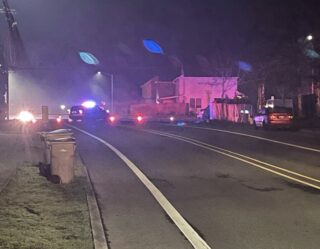“I’m disturbed and angry… This road no longer serves our community… We simply cannot afford to wait any longer.”
— Jason Snider, Mayor of Tigard
All over Oregon there are state-owned urban arterials that used to be major highways but are now neglected by the Department of Transportation as bodies continue to pile up. In planning parlance these are often called orphan highways because ODOT pays much more attention to bigger and shinier interstates and freeways.

These old highways don’t get the necessary safety and maintenance investments they need to reflect their new, more urban uses. Put simply, they are not fit for human habitation and the result is too often death and destruction.
The best local example of this tragic phenomenon is 82nd Avenue where two deaths in spring 2021 finally tipped the political balance enough to create a breakthrough.
82nd Avenue is to Portland like Hall Boulevard (OR 141) is to Tigard. And now — after another death — elected officials in Washington County are also pushing the state for funding and actions to take more responsibility for the mess they’ve created.
On March 4th an 86-year-old woman was walking across SW Hall near SW Lucille Court with her 57-year-old daughter. Police haven’t released all the details, but we know they were struck by the driver of Jeep Renegade. After the driver hit these two women, they didn’t stop to help. The younger woman, Karen Kain, died at the scene and her mom is still hospitalized. Police found the car four days later and are still searching for the suspect.
Advertisement
This crash was met with outrage by Tigard Mayor Jason Snider, who has already worked for years with city staff to get the road transferred to local ownership. At the Oregon Transportation Commission meeting on March 10th, Snider gave ODOT leaders and OTC members a piece of his mind. “One of our community members was killed and another critically injured in a hit-and-run crash on SW Hall Boulevard, an ODOT owned and maintained urban arterial in Tigard,” he said, in a nod to his audience.
Here’s more from Snider’s comments:

(Photo: Tigard Police)
“I was deeply saddened to hear about this fatal crash… However, I’m also disturbed and angry. While the actions of this negligent driver are certainly to blame. We cannot ignore the fact that Hall Blvd, like many of the Portland region’s urban arterials has been subjected to deferred maintenance and lack of critical safety investment for years with insufficient crossing opportunities, incomplete sidewalks, inadequate bike facilities, deficient public transit stops and general poor surface condition. This road no longer serves our community… This most recent crash and loss of life is a heartbreaking reminder to all of us that immediate action is needed to actively and collaboratively pursue investments and improvements along this roadway. Commissioners, as you deliberate on allocating new flexible federal dollars toward transportation needs throughout the state, I implore you to direct ODOT to maximize investment of this funding on Hall Boulevard. We simply cannot afford to wait any longer.”
OTC Chair Bob Van Brocklin responded to Mayor Snider by saying the commission understands his feelings about the “terrible situation” and added, “we’ll attempt to take action.” After sharing sympathies for the victims, Van Brocklin said, “Unfortunately, we we have far too many [deaths] around the state in an era of frankly, limited resources.” “The frank truth of it is,” he continued, “we have a lot more needs around the state than we have funding for and it puts us all in an untenable position and leads to the kind of safety issues that you’re describing to us.”
Later in that meeting Chair Van Brocklin would get an update on ODOT’s work to expand I-5 between Oregon and Washington, a project that is estimated to cost well over $4 billion and has accrued nearly $300 million in planning expenses already without turning one shovel of dirt.
To their credit, thanks in large part to the advocacy around 82nd Avenue, ODOT has finally responded to the orphan highway issue in a new, more substantive way than ever before. As they work with the OTC to allocate around $400 million in flexible federal funds from the Infrastructure Investment and Jobs Act (IIJA), they’ve created a new funding category called “Great Streets.”
In their definition of Great Streets ODOT acknowledges the problem, but passes the blame to the federal government. “Many of these roads need significant improvements,” reads a slide from a recent ODOT presentation, “but the way the federal government and ODOT break funding into siloes makes it difficult to meet the comprehensive needs of these critical routes.” Either way, it’s a step forward to fund orphan highways.
But it’s still not enough, given the urgent needs expressed by Mayor Snider.
Ironically there is one part of Hall Blvd ODOT is spending a lot of money on: the overcrossing of Highway 217 as part of their $158 million widening project. Unfortunately it’s about 0.2 miles south of where Karen Kain and her mom were hit.
UPDATE: Another person was killed this morning (March 15th) in a separate hit-and-run crash on SW Hall Blvd. Police say the person was hit by a driver while walking near Farmington Road, about 4.5 miles north of where Karen Kain and her mom were hit last week.



